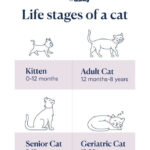It might seem natural to feed your feline friend raw fish, perhaps envisioning them enjoying a piece of sushi. However, while cats are carnivores and fish can be a part of their diet, raw fish presents significant health risks. Is raw fish really safe for cats? Generally, the answer is no.
The Dangers of Thiaminase in Raw Fish
Raw fish contains an enzyme called thiaminase. This enzyme can break down thiamine, an essential B vitamin vital for your cat’s neurological function. A deficiency in thiamine can lead to serious health issues in cats.
Neurological Problems and Thiamine Deficiency
When thiamine is broken down by thiaminase, it can cause thiamine deficiency in cats. This deficiency can manifest in neurological problems, ranging from lethargy and loss of coordination to more severe conditions like seizures and convulsions.
What About Sushi-Grade Raw Fish?
Even human-grade sushi, which is prepared to be safe for human consumption, is not recommended for cats. The presence of thiaminase remains a concern, regardless of the fish’s quality. Furthermore, raw fish, including sushi, can harbor bacteria and parasites that can cause gastrointestinal upset in cats, leading to vomiting and diarrhea.
Safer Fish Options for Your Cat
While raw fish is risky, cooked fish, in moderation and prepared without harmful seasonings, can be a safer treat for cats. Cooking fish eliminates thiaminase and kills potential parasites and bacteria. However, it’s always best to consult with your veterinarian about the most appropriate and safe diet for your feline companion. They can provide tailored advice based on your cat’s individual health needs and dietary requirements.
Conclusion:
While cats might instinctively be drawn to fish, raw fish poses considerable health risks due to thiaminase, and potential bacterial and parasitic contamination. To protect your cat’s health, it’s best to avoid feeding them raw fish and explore safer, cooked options or commercially prepared cat foods. Always prioritize your cat’s well-being and consult with a vet regarding their dietary needs.


